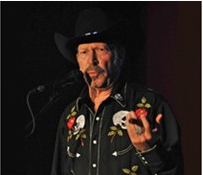With Friedman, it’s showtime most of the time. On this occasion, he’s in town with Mary Lou Sullivan, his biographer, who attempted to condense his strange life into 300 pages. Hers was an unenviable task.
“A lot of people try to be themselves,” Friedman says. “That’s the hardest thing to be.”
So he’s been many selves, which Sullivan documented in the book, such as the garrulous raconteur who asks outright, “What all do you want to know?” A pause. “Can I smoke this mother (expletive) in here? I guess I could just do it and plead ignorance.”
Sullivan’s book, which was released last month, is called “Everything’s Bigger in Texas: The Life and Times of Kinky Friedman.”
“I Guess I Could Just Do It and Plead Ignorance” also would have worked as a title.
A successful writer himself, Friedman acknowledges he needed a biographer. “The first half of my life I don’t remember.”
So he relied on Sullivan to do the homework. She researched his childhood in Houston as a Jewish outcast in West University Place. His Peace Corps run in Borneo. A wild run as a misunderstood songwriter in the ’70s. Getting lost in a snowstorm of cocaine in the ’80s. A reinvention as novelist and humorist in the ’90s and a gubernatorial candidate in the 2000s.
[…]
Sullivan found a few cracks that let a different side of Richard Samet Friedman show. Particularly with regard to his parents: Tom, an Air Force pilot who flew dozens of missions over Germany, who studied psychology upon his return from the war; and Minnie, who taught Shakespeare and loved the stage.
They’re almost like the Greek chorus of Sullivan’s book, appearing and reappearing with words of encouragement and advice. For all of Friedman’s bluster, when he talks about his parents – in the book or conversation – the quips cease.
“I guess if your father runs off when you’re 2 like Obama’s did, you build a myth about him,” he says. “But my parents were my two best friends. If you grow up like that, it really devastates you when you lose them. They were my heroes.”
Then, finally, an oft-repeated quip.
“I always say a happy childhood is the worst possible preparation for life.”
The implication of the last statement is that Friedman is a failure whose recognition will likely come after he’s gone, though he’s been successful enough to fund habits ranging from cocaine to cigars to gambling.
By some measures, the failure argument could be made: Friedman’s albums were misunderstood in their day and didn’t really sell, even though they impressed some formidable songwriters. The cover of Sullivan’s book bears a quote from Dylan: “I don’t understand music. I understand Lightnin’ Hopkins. I understand Leadbelly, John Lee Hooker, Woody Guthrie, Kinky Friedman.”
Despite the high praise, Friedman stepped away from writing songs and reinvented himself as an author in the ’90s. His mystery novels found an audience, but he never achieved the success of a Carl Hiassen; Friedman’s former editor attributes it to laziness in the book. And Friedman’s runs for public office never resulted in holding public office.
“My shrink told me if you fail at something long enough, you become a legend,” he says. “That’s one way of doing it. Politics, I think I can safely say I failed. That’s really how I see myself commercially, professionally. But I think I’m in good company. John Lennon, Winston Churchill: They didn’t feel like life’s winners. But it really is about the rainbow. That’s the key. There was a guy who was the Justin Bieber of the art world in Van Gogh’s day. We don’t know his name today, but he sold a lot of his (expletive) art, and Van Gogh didn’t. So I’ll take a little success late in life.”
I was once a fan of Kinky Friedman’s. Bought several CDs, read his mystery books, saw him at the Laff Stop in the early 90’s – it was a great show. His candidacy for Governor in 2006 ended all that. I’d forgotten till I read this story and started thinking about what I was going to write, but I’ve never ripped any of my Kinky Friedman CDs to iTunes. I was too mad at him to enjoy the music any more. I’ve mellowed a bit since then, but it’s safe to say I’ll never be that kind of fan again.
The thing that struck me in this story is the bit in that penultimate paragraph about Friedman’s books not being as successful as they perhaps could have been. I feel like the same could be said about Friedman’s political career. One thing I noticed early on in his 2006 campaign is that in each feature story written about his candidacy he was cracking the same jokes. Politicians repeat themselves all the time, of course, but someone whose claim to fame is being an entertainer ought to do better than that, especially if he never really bothers to become proficient in policy. Indeed, if humor is a substitute for policy, the last thing it can do is get stale. Later on, Friedman did make an effort to become better at policy; in his 2014 run for Ag Commissioner, he reasonably and somewhat presciently latched onto the issue of legalizing hemp in Texas, as a potential boon for farmers. Not a bad idea, but he never developed it beyond basic talking points, and there was nothing more to his platform than that. On his third attempt to win statewide office, surely he could have done better than that.
So anyway, I’m sure the forthcoming biography will be an engaging read. Whatever else you can say about Kinky Friedman, he’s never been boring, and I’ve no doubt he has some great stories to tell. But there could have been more. We’ll never know how much more.

